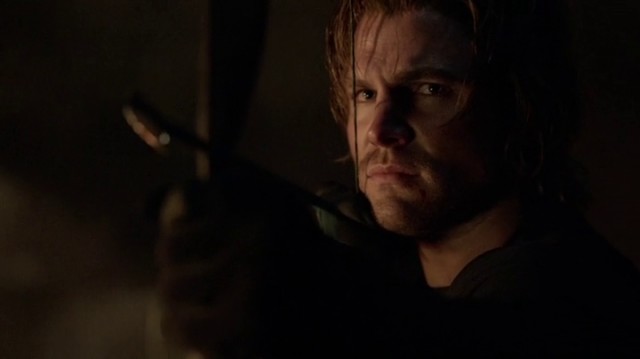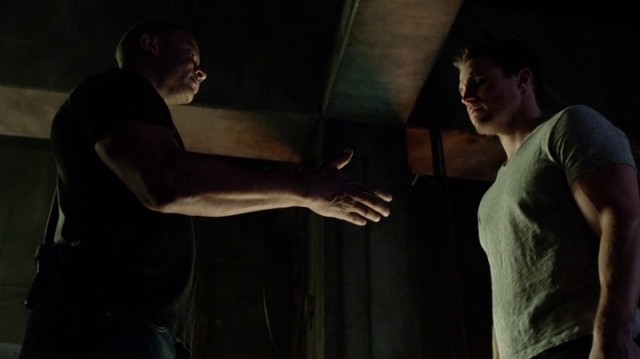Arrow Season 1, Episode 23 ‘Sacrifice’
Directed by David Barrett
Written by: Greg Berlanti (story), Marc Guggenheim & Andrew Kreisberg (teleplay)
returns to The CW for season 2 in September
With a title like ‘Sacrifice’, there was no denying that someone was going to die in tonight’s episode. And although ‘Sacrifice’ tries to get clever with a few expected misleads (one that lands really well), Arrow decides to eliminate the easiest option – but one I wished they hadn’t, for reasons I’ll explain later. But with the wonky character development pushed to the side, ‘Sacrifice’ sets its sights on one event, and executes it with confidence, keeping things moving even when some of the emotions fall flat.
Unfortunately (a phrase I feel I use often on this show), the island material for the season culminates a single explosion, a fitting end for what was largely an empty parallel to Oliver’s adventures in Starling City. There were occasional attempts at trying to ground Oliver’s emotions in his experiences on the island, but these didn’t really add up to much, thanks to the convoluted double and triple-crossing characters and large sense that people were running in circles. And that’s what the ending feels like: as Yao Fei lies dead on the ground, Oliver breaks the three of them free, and they take out the entire camp by re-routing one of the missiles right back into the camp (apparently re-routing consists of unplugging and replugging a single wire). Then Oliver kills his first man with an arrow (the dickhead general who had a lot of time on-screen, but never amounted to much), and that’s the end of the island material, for this season. Hopefully season two will accelerate oh… four years forward in the island timeline, and we can start with Oliver learning Russian and becoming part of the mafia (remember that?).
The island material is a very small part of the episode – the rest of it is a flurry of fight scenes and girls crying, as Malcolm begins The Undertaking (which isn’t really an undertaking of any kind, just an explosion) and Oliver and company try to stop it. Since every relationship on this show experiences ‘season finale’-type dramatic swings in every episode, the various heartfelt moments (Arrow and Laurel making out in the sunlit entrance to the Queen mansion) and ‘shipping moments (Thea and Roy making out as The Glades are looted, setting off sparks so our hearts can swoon over the romantic image) really don’t feel out of place, goofy as they may be at times.
But nobody tuned in for relationships, so Arrow quickly gets to the point, igniting things in the opening scene as Malcolm finally snaps in front of his son. He plays the final voicemail his wife left as she lay dying, and when Tommy questions his motives, he bursts: “They all deserve to die the way she did!”. He knocks out Tommy, and isn’t seen until Arrow and Diggle (who’s all good, despite all the beef the last couple weeks) show up, and both get their asses kicked by him in a frenetic, tight little fight sequence in the Dark Hood’s armory.
Malcolm was never the strongest antagonist, but they give him enough maniacal rationale in this episode that he doesn’t become a completely one-dimensional villain (it’s close, but pales heavily in comparison to the island general). Malcolm is a powerful man with a broken heart – and we know how severely people in Starling City react to with matters of the heart (it must be something in the water), so his quest for vengeance against a faceless enemy is consist with the show’s romanticized tendencies. However, his idea of ‘sacrifice’ is quite the opposite of everyone else’s: he’s not trying to die for what he believes in, only trying to destroy it from the inside.
During their final interactions, Malcolm points out something to Oliver that gives definition to one of the overarching issues of the show: what exactly is Arrow fighting for? This question permeated the early episodes of the season, and slowly seeped away as The Undertaking came into focus as the antagonistic presence of the season. Yes, he’s fighting to save the lives of thousands of people – but what was he doing before that, when he was killing all the people on that list? Avenging his father’s death – or simply bottlenecking the evil of Starling City, revealing a deeper evil within now able to run rampant despite Arrow’s valiant attempts to stop them. I suppose this is a question for season two, but the various times they’ve presented it in season one, they’ve struggled to find something of substance to say about it. In this episode, Felicity tells Quentin that “he’s willing to sacrifice a lot for this city… doesn’t that make him a hero?” The simple answer to that question? No – Arrow may have eliminated evil people in the name of vengeance, but he killed parents, brothers, uncles (no women, of course – this is not an ‘edgy’ superhero show) for misguided reasons – and the show seems willing to forgive him that, under the pretext of the morally ambigious hero, a character Oliver Queen surely is not.
In the end, everyone’s efforts turn out to be for naught – Malcolm goes out with a phrase about “redundancy” in business, and the final twist is revealed: there were two devices in Starling City, though only one of these appeared to have symbolic importance (the device in the Glades was placed under the spot where his wife died, and the other was placed in the middle of the city because… he didn’t like a hamburger joint in the neighborhood?). Quentin’s efforts turn out to only be half-heroic, as everything starts falling apart around his daughter Laurel, who is in the office trying to collect papers during a f-ing earthquake (seriously… the hell was she thinking?). It adds a nice bit of irony to Quentin’s journey in the episode, given his self-sufficing speech to her about “becoming a shadow” after his daughter died, not bothering to address his rampant alcoholism or dickhead attitude. Turns out his redemption is slightly hollow – he protects the lower-class members of the city, but can’t even save his own daughter.
Neither can Oliver – despite their love being strong and true (I’m being sarcastic), the eternally-conflicted Tommy shows up to save Laurel. His dad’s evil, his best friend started banging his girlfriend the day after they broke up – but he knows that he loves Laurel, and tells her as he saves her from under a massive rock. She escapes, the building goes boom, and seconds later, Oliver shows up, the man who saved the city, but couldn’t protect the people he loved. Tommy gets in an apology, but he dies as Oliver lies to him about not killing his father (a wonderful way to send out a friend), and the season ends as part of Starling City is reduced to rubble, with everyone waiting outside the CNRI office for the Hood to step out with Tommy in his hands.
In the end, the entire Merlyn family made the sacrifice – and I question whether that was entirely the right move, particularly in Tommy’s case. The second half of the season had shown a bit of growth with his character, and the toxic dynamic between Oliver and Tommy could’ve led to an awesome showdown in season two. Think of it: Tommy finds out Oliver lied in the rubble, and the season ends with him in a hospital, seething over a news cast of Malcolm Merlyn’s death at the hands of the vigilante. Driven by anger, Tommy disappears, and returns late season 2 to be set up as the season 3 antagonist, the Dark Hood returned to take down Oliver once and for all.
Ok, dream over – but wouldn’t that be a better way to end than the way it did? I understand the notion (wipe the slate clean), but the Tommy/Oliver relationship had been established as an important component of the show, now lost. People are going to hate me for this (and I kind of hate myself for saying it, because I love the character) but I think Diggle would’ve been a better choice, had the writers insisted on making a sacrifice of any kind. With Roy Harper dying to become a hero, he makes a natural second season pairing for Oliver, who can rely stories of his times on the island – giving the flashbacks some freakin’ purpose – while training him to be his second and command (plus with the colors green and red as their namesakes, they’ll be a massive hit during the holidays. It would suck to lose Diggle, but the character arcs they tried to do with him amounted to nothing, and despite his fun little triad with Oliver and Felicity, I think he’s a more expendable character than Tommy (despite his various arcs mostly being weak in their own right).
The first season of Arrow had pockets of extreme promise, but kind of settled into a lesser, melodramatic version of itself during the ‘filler’ episodes between December and April. When the show found focus and wasn’t trying to contrive character interactions and horribly-written bad guys upon us, they found some intriguing beats to hit (like the first Huntress appearance) about a vigilante who doesn’t hesitate to kill for what he believes in (no matter how grey or misguided that belief may be), trying to integrate himself back into a broken family and a world that had moved on without him. 23-episode seasons and The CW may not be a great match for Arrow, but with a few tweaks (like two half-season arcs instead of one vague, super drawn-out one), there’s still world of potential to be realized in season two.
Other thoughts/observations:
– Is it bad that I was shouting at Tommy to run away when Laurel got trapped? If I had to choose between keeping the Lance family or the Merlyn family for season two, I think we all know what I’d choose.
– Yes, there’s a good chance Malcolm lives. Should he? Tommy’s death doesn’t really give him much motivation to return – it’s not like Malcolm could blame Arrow for his son dying, since it was his plan to blow up the city. We don’t see him get buried, which in superhero terms means there’s always a chance for return (or even if they get buried… remember Superman?)
– why did Tommy have to get drunk to get angry?
– Thea does three things this episode. 1) she yells at Roy not to text while driving, because that’s seriously not safe (having been in her own accident recently), 2) she gets teary-eyed and 3) nails someone in the head with a bottle, thanks to her ‘wicked aim’. Are they still setting up Thea to possibly be a sidekick? They really, really need to find something for her to do except yell “I DON’T UNDERSTAND” and storm out of everywhere crying.
– Quentin’s boss is worried about getting to his COMSTAT meeting on time… could you imagine a The Wire-style COMSTAT meeting in Starling City? Spin off!
– Would Felicity allow herself to leave such an obvious digital trace?
– Moira confesses to the world: “I have failed this city.”
– people hear about their neighborhood exploding – so they decide to make signs and go looting?
– Tommy says “I am my father”, earning award for Most Unfounded, Ridiculous Statement of the Episode. Congrats, big guy – we’ll leave some flowers at the gravestone next time we’re in town.
– Oliver putting the arrow through himself to kill Malcolm was pretty badass.
– I hope you guys enjoyed my reviews of Arrow‘s first season. Barring a human-controlled seismic event in my neighborhood, I’ll be back in the fall with reviews of season two.






